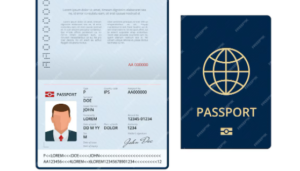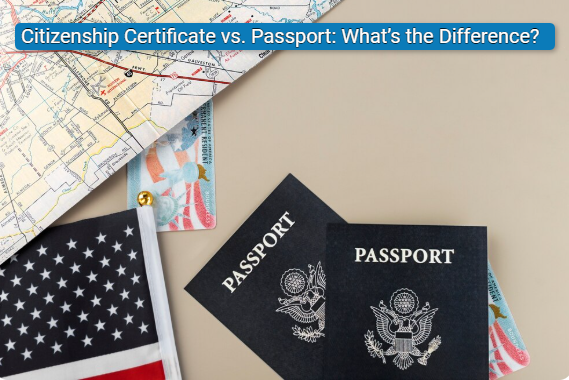Citizenship Certificate vs. Passport: Why It’s Not One or the Other
Let me guess.
You (or your child) weren’t born in the U.S. But at least one of you has a U.S. citizen parent. Maybe you already have a passport—or maybe you’re applying for one now. And someone told you:
“Oh, you don’t need a certificate. Your passport proves everything.”
Or maybe it was the opposite:
“You’d better file for the certificate or they’ll question your status.”
And now? You’re stuck.
Do you need a passport, a “certificate of citizenship”, or both? And what’s the real difference anyway?
We’ve had this conversation many times. With new parents. With teens applying to college. With adults who realize too late that their status was never made official. So let’s talk about what matters—not just the paperwork, but the peace of mind that comes from having the right documents for your life.
Let’s Start With This: What Are You Trying to Prove?

Citizenship is one of those things that seems simple—until someone asks you to prove it.
And if you were born abroad, adopted internationally, or became a citizen through your parents, that proof isn’t always easy to show. It doesn’t matter how long you’ve lived here, how American you feel, or what your story is.
When a government agency or official asks, they want documentation.
So when we talk about “certificate of citizenship vs passport”, the real question is this:
When the time comes to prove I’m a U.S. citizen, will my document be enough?
What Exactly Is a Certificate of Citizenship?
The “certificate of citizenship” is a legal proof from USCIS that says, “This person is a U.S. citizen under the law.” You don’t get it at the post office. You don’t get it automatically. You have to apply for a certificate of citizenship using the form N-600, and USCIS reviews your case.
You’d use this if:
- You were born outside the U.S. but had a U.S. citizen parent
- You were adopted by U.S. citizens
- Your parent naturalized when you were a minor, and no one ever filed the paperwork
- You became a citizen but never had proof to show for it
Once approved, the certificate never expires. And it’s often the only thing that clears up questions in immigration cases, legal disputes, government agencies, or courts.
We’ve had families break down into tears when it finally arrives. Not because it’s a piece of paper, but because it finally settles a question that’s been hanging over them for years.
What Does a Passport Prove?

A passport is issued by the Department of State and proves you’re a citizen, mostly for travel. It’s what you show at the airport when applying for a driver’s license, and sometimes for jobs or school.
It’s much easier to get than the certificate, and for most Americans, it’s the only document they ever need.
But if your citizenship is not straightforward, or if it was acquired through your parents, your passport is always enough to prove us citizenship.
And here’s something not everyone tells you:
You often need a certificate to get a passport in the first place, especially if you weren’t born in the U.S.
Certificate of Citizenship vs Passport: What’s the Difference?
Let’s break it down as simply as we can:
| Certificate of Citizenship | U.S. Passport | |
| Proves Citizenship? | Yes | Yes |
| Issued By | USCIS | U.S. Department of State |
| Never Expires? | Yes | No (10 years for adults, 5 years for minors) |
| Used for Travel? | No | Yes |
| How You Get It | File Form N-600 with supporting documents | Apply at the passport agency with proof of citizenship |
Do You Need Both?
Maybe not today. But maybe soon.
We usually tell clients this:
A passport is what gets you where you want to go. A certificate is what protects you when questions arise.
If you’re just traveling or applying for a job, a passport might be fine.
But if you’re applying for financial aid, sponsoring a family member, going through immigration proceedings, or dealing with anything that requires full legal status, you’ll want that certificate.
The N-600 certificate of citizenship might not be something you flash often, but when you need it, you’ll be grateful you have it.
What If You Never Got One?

That’s more common than you’d think.
A lot of people, especially those who were adopted, or whose parents naturalized, never had anyone file their citizenship certificate application.
They might have a passport. They might even think they’re “all set.” But when they apply for benefits, or USCIS asks for further proof, they realize something’s missing.
The good news? You can still apply. Even as an adult.
File the U.S. citizenship form n 600, pay the n 600 filing fee, and provide the right documentation. You’ll get it. But it’s better to file before it becomes urgent.
Let’s Be Honest: This Isn’t Just Paperwork
This is about peace of mind. It’s about having one less thing to explain, one less thing to prove.
It’s about walking into an immigration office, a college financial aid meeting, or a passport agency with your head held high—because you’ve got both documents in hand and no one can question who you are.
So if you’re wondering how to get a certificate of citizenship, or whether your passport is enough, the real question is:
Do I want to wait until something goes wrong—or do I want to settle this now, while I still have control?
We’re Here to Help You Do It Right

At Passage Immigration Law, we help people just like you file the N-600 application for a certificate of citizenship every day.
Consult us today and start your application and get the proof, protection, and peace of mind you deserve.
DISCLAIMER: This article offers general legal information, not legal advice. Do not rely upon this information without seeking legal counsel. If you need legal advice, you may contact us directly to speak with an attorney. We disclaim all liability with respect to actions taken based on any information presented. Every case is different, and outcomes will vary depending on the unique facts and legal issues of your case.







